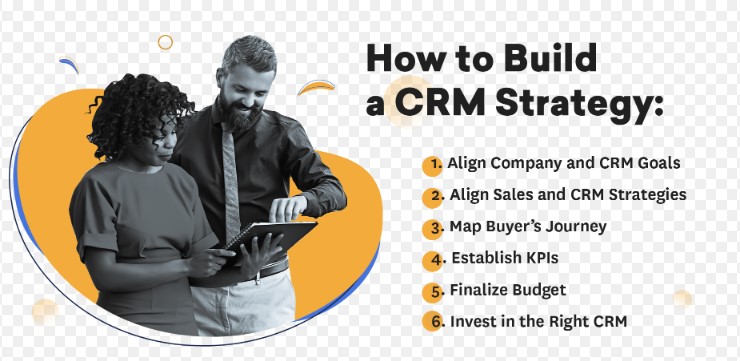In today’s competitive business landscape, customer relationship management (CRM) is essential for success. A reliable and efficient CRM tool can help businesses streamline their customer interactions, improve customer relationships, and ultimately increase sales. With so many CRM tools available, it’s important to choose the right one for your business and customize your CRM strategy to meet your unique requirements. In this article, we will explore the top CRM software solutions and how you can customize your CRM strategy to maximize their benefits.
1. Salesforce
Salesforce is a cloud-based CRM tool that offers a wide range of features, including lead management, opportunity management, customer segmentation, and marketing automation. It’s ideal for businesses of all sizes and industries and can be customized to meet specific requirements.
2. HubSpot
HubSpot is an all-in-one inbound marketing platform that includes CRM, marketing, sales, and customer service tools. Its CRM tool offers features like contact management, deal tracking, and email tracking, and can be customized with integrations and workflows.
3. Zoho CRM
Zoho CRM is a cloud-based CRM tool that offers features like lead management, contact management, and sales forecasting. It also integrates with several third-party applications, making it easy to customize to meet specific requirements.
4. Pipedrive
Pipedrive is a sales-focused CRM tool that offers a visual pipeline view of your sales process. Its features include contact management, deal tracking, and sales forecasting, and it can be customized with integrations and workflows.
5. Freshsales
Freshsales is a cloud-based CRM tool that offers features like lead scoring, contact management, and sales forecasting. It also includes several integrations and can be customized to meet specific requirements.
6. Insightly
Insightly is a cloud-based CRM tool that offers features like contact management, project management, and workflow automation. It also integrates with several third-party applications and can be customized with custom fields and workflows.
7. Agile CRM
Agile CRM is a cloud-based CRM tool that offers features like contact management, marketing automation, and sales forecasting. It also includes several integrations and can be customized with workflows and custom fields.
8. Infusionsoft
Infusionsoft is a comprehensive CRM tool that includes features like lead management, contact management, and marketing automation. It’s ideal for small businesses that need a complete solution for managing their customer interactions and can be customized with workflows and custom fields.
9. Capsule CRM
Capsule CRM is a simple and easy-to-use CRM tool that offers features like contact management, task management, and sales forecasting. It’s ideal for small businesses that need a basic CRM tool and can be customized with custom fields and integrations.
10. Nimble
Nimble is a cloud-based CRM tool that offers features like contact management, social media integration, and sales forecasting. It’s ideal for businesses that need a comprehensive solution for managing their customer interactions and can be customized with integrations and custom fields.
When customizing your CRM strategy, it’s important to consider your specific requirements and industry. Some key factors to consider include:
- Integrations: Ensure your CRM tool integrates with other business applications you use, like email, social media, and project management tools.
- Customization: Look for a CRM tool that offers customization options like custom fields and workflows to tailor the tool to your specific requirements.
- Training: Provide comprehensive training to all employees to ensure successful adoption and use of the CRM tool.
- Analytics: Regularly monitor and analyze data to identify areas for improvement and adjust your CRM strategy accordingly.
In conclusion, customizing your CRM strategy with a reliable and efficient CRM software solution can help businesses improve customer relationships and increase sales. By choosing the right CRM tool and customizing it to meet your specific requirements, you can streamline your customer interactions, improve customer satisfaction, and create a competitive advantage.
Here are some FAQs related to customizing your CRM strategy:
-
What does it mean to customize your CRM strategy?
Customizing your CRM strategy means tailoring your CRM tool to meet your specific business requirements. This may involve customizing fields, workflows, and integrations to ensure the tool meets your unique needs.
-
Why is it important to customize your CRM strategy?
Customizing your CRM strategy can help ensure that your CRM tool is effective in managing your customer interactions and improving customer satisfaction. By tailoring the tool to your specific requirements, you can streamline your processes, improve productivity, and increase sales.
-
What factors should I consider when customizing my CRM strategy?
When customizing your CRM strategy, consider factors like integrations, customization options, training, and analytics. These factors can help ensure that your CRM tool is effective and meets your specific requirements.
-
How do I ensure successful adoption of a customized CRM tool?
To ensure successful adoption of a customized CRM tool, provide comprehensive training to all employees and involve them in the selection and implementation process. It’s also important to regularly monitor and analyze data to identify areas for improvement and adjust your strategy accordingly.
-
Can I customize my CRM strategy as my business grows and changes?
Yes, it’s important to regularly review and update your CRM strategy as your business grows and changes. This may involve adjusting workflows, fields, and integrations to ensure that the CRM tool remains effective in managing your customer interactions and increasing sales.
In conclusion, customizing your CRM strategy with a top CRM software solution can help businesses improve customer relationships and increase sales. By considering factors like integrations, customization options, training, and analytics, businesses can ensure that their CRM tool is effective and tailored to their specific requirements.
